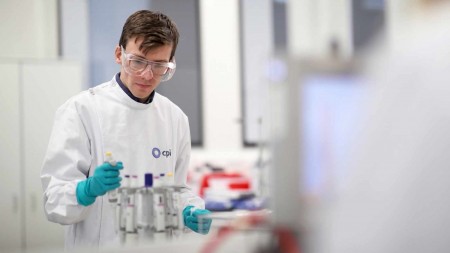CPI optimises development of novel biotherapeutics with BioStreamline project
 CPI, a UK-based technology innovation centre and a founding member of the High Value Manufacturing Catapult, has recently disseminated the results of the £11.2 million BioStreamline project to optimise the development of novel biotherapeutics.
CPI, a UK-based technology innovation centre and a founding member of the High Value Manufacturing Catapult, has recently disseminated the results of the £11.2 million BioStreamline project to optimise the development of novel biotherapeutics.The project focused on accelerating the discovery and development of monoclonal antibodies and aimed to overcome key bottlenecks in the biologics supply chain. By improving biologics production, superior drugs can be identified earlier which will lead to more efficient development and manufacture of biologics.
The collaborative project brought together a number of partner organisations across the spectrum of drug discovery and development, including Lonza Biologics, UCB Celltech, Sphere Fluidics Ltd, Horizon Discovery Group plc, Alcyomics Ltd and CPI. Funding for the project was provided by the UK Government’s Advanced Manufacturing Supply Chain Initiative (AMSCI).
A dissemination event took place on the 26thJune 2019, showcasing a number of results from the project and discussing the potential impact on overcoming some of the most significant shortcomings of the biologics supply chain. One of the key deliverables of the project was the development of Sphere Fluidics’ Cyto-MineâSingle Cell Analysis System and its associated workflows. The microfluidic picodroplet technology of Cyto-Mine® enables the screening of B-cells during antibody discovery and analysis of antibody-producing clones for selection of high-producing cell lines during cell line development. Cyto-Mine® has now been supplied to international biopharma companies and contract manufacturing organisations (CMOs) and is currently producing promising results in reducing cell line development timelines. This, in turn, will increase the speed and efficiency of novel drugs entering the biologics supply chain.
Another key deliverable of the project has been in the expression and purification of more than 50 monoclonal antibodies (mAbs) using industry-leading platforms. The biochemical, biophysical and stability data collected on each of these molecules has contributed to the design of a developability tool which will enable more accurate decision-making during process development. Although these methodologies were developed for mAbs, they could also be applicable to other emerging therapeutic modalities such as antibody drug conjugates, bispecifics and viral vectors.
In addition to the achievement of these key project outcomes, CPI also created seven new jobs with roles in line with the project commitments. Further to this, three employees were seconded to UCB and Lonza to gain experience and expertise in molecular biology, upstream processing and analytical assessment. The skills gained during this time were then used in the BioStreamline project on their return to CPI.
John Liddell, Chief Technologist, CPI, said: “It is exciting to see the outcomes of this project and the impact it will have on both the biotherapeutics industry and society as a whole. The BioStreamline project has also been extremely successful from a CPI perspective, enabling the enhancement of our experience and expertise around upstream and downstream workflows, analytics, mass spectrometry, data analysis and data modelling.”
Lucy French, Operation Manager, Alcyomics, said: “The BioStreamline project has allowed companies to bring together their expertise and work towards the common goal of streamlining the biologics supply chain. As part of the project team, Alcyomics have developed a unique human in vitroassay that will enable high throughput screening at the early stages of development, allowing identification and elimination of those therapeutics that are likely to cause an adverse effect. The novel assay will not only reduce product development costs and timelines, but also predict the occurrence of systemic adverse immune reactions.”
Dr Rob Marchmont, Vice President of Sales and Marketing, Sphere Fluidics, said: "We are delighted at the outcomes of the BioStreamline project. The development of the Cyto-Mine® platform provides the crucial acceleration needed in monoclonal antibody development and production. Deploying Cyto-Mine® in the biologics area significantly improves efficiencies and reduces timelines in the development workflow and therefore will boost the entry of biologics into the supply chain. Overall this has the potential to have a huge impact on the way biotherapeutics are produced in the UK."





















